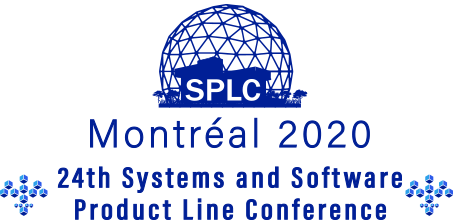The SPLC 2020 Demonstrations, and Tools track provides an opportunity for live demonstrations of academic or commercial systems and software product-line tools. Accepted demonstrations and tools will be presented within a main conference session (using a mix of slides and the running tool) and at demo booths — during a dedicated session or during breaks and on demand.
IMPORTANT DATES
We extended the deadlines due to COVID-19, the new deadlines are firm:
- Paper submission:
June 5, 2020July 6, 2020 - Notification:
June 26, 2020July 24, 2020 - Camera-ready papers:
July 3, 2020August 7, 2020
TOPICS
Areas of interest include, but are not limited to tools supporting:
- feature modeling,
- variant management,
- validation and verification,
- product derivation and generation,
- product-line testing and further analyses,
- measurement and optimization of non-functional properties of product lines,
- language product lines.
or simply any tool that supports dealing with variability or configurability in different domains such as IT, software-intensive and cyber-physical systems, Web and Cloud-based systems (incl. (micro) service-oriented systems), Internet of Things, consumer electronics, automotive, automation, software ecosystems and multi-product lines, etc.
SUBMISSIONS/PUBLISHING
Demonstration and tool papers must present either a new tool, a new tool component, or novel extensions to an existing tool. Tools previously presented at SPLC should include a specific description of the new features of the tool. Tool papers should provide a short description of the theoretical foundations, after which emphasis should be on the design and implementation concerns (incl. software architecture and core data structures), closed by the description of experience with realistic case studies. It is strongly encouraged to make the tool publicly available, preferably on the web, even if only for the evaluation process.
The page limit for all demonstration and tool submissions is 4 pages, including figures and references plus at most 2 pages for an appendix (which will not be published in the proceedings) describing how the concept or tool will be presented during the conference. Submissions must also include a link to a short (max. 5 minutes) video demonstrating the core features of the approach or tool.
Submissions must be in PDF format. The authors should use the ACM Master article template. Latex users should use the “sigconf” option; as such, they are recommended to use the template in “sample-sigconf.tex”. The following latex code can be placed at the start of the latex document:
\documentclass[sigconf]{acmart}
\acmConference[SPLC'20]{24th ACM International Systems and Software Product Line Conference}{19--23 October, 2020}{Montreal, Canada}
Submissions should be sent using EasyChair: submit here.
At least one author of each accepted submission must register and attend SPLC 2020 in order for the paper to be included in the proceedings.
EVALUATION
Each submission will be reviewed by at least three members of the demonstrations and tools selection committee. The criteria for evaluating a submission include:
- the relevance of the proposed demonstration to the SPLC audience,
- the technical soundness of the demonstrated tool,
- the originality of the submission’s underlying ideas,
- the quality of the submission’s presentation and of its associated video, and
- the degree to which the submission considers the relevant literature.
CHAIRS
PROGRAM COMMITTEE
- Jessie Carbonnel, University of Montpellier and CNRS
- Wardah Mahmood, Chalmers University of Technology
- Sahar Badihi, The University of British Columbia
- Davide Basile, University of Florence
- Mahsa Varshosaz, IT University of Copenhagen
- Loek Cleophas, TU Eindhoven and Stellenbosch University
- Jabier Martinez, Tecnalia
- David Benavides, University of Seville
- Ștefan Stănciulescu, ABB Corporate Research
- Christoph Elsner, Siemens AG
- Mikaela Cashman, Iowa State University
- Gilles Perrouin, University of Namur
- Natsuko Noda, Shibaura Institute of Technology
- Jaejoon Lee, University of East Anglia
- Oscar Diaz, University of the Basque Country
- Vander Alves, University of Brasília
- Sofia Ananieva, FZI Research Center for Information Technology
- Clément Quinton, University of Lille
- Hugo Martin, University of Rennes


